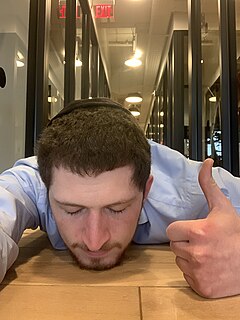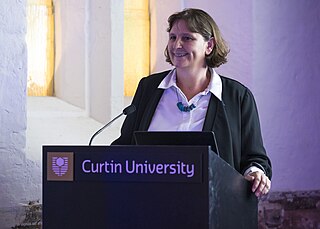Related Research Articles

Work design is area of research and practice within industrial and organizational psychology, and is concerned with the "content and organization of one's work tasks, activities, relationships, and responsibilities" (p. 662). Research has demonstrated that work design has important implications for individual employees, teams, organisations, and society.

Job satisfaction, employee satisfaction or work satisfaction is a measure of workers' contentedness with their job, whether they like the job or individual aspects or facets of jobs, such as nature of work or supervision. Job satisfaction can be measured in cognitive (evaluative), affective, and behavioral components. Researchers have also noted that job satisfaction measures vary in the extent to which they measure feelings about the job. or cognitions about the job.
Emotional labor is the process of managing feelings and expressions to fulfill the emotional requirements of a job. More specifically, workers are expected to regulate their emotions during interactions with customers, co-workers and managers. This includes analysis and decision making in terms of the expression of emotion, whether actually felt or not, as well as its opposite: the suppression of emotions that are felt but not expressed. This is done so as to produce a certain feeling in the customer or client that will allow the company or organization to succeed.

A job interview is an interview consisting of a conversation between a job applicant and a representative of an employer which is conducted to assess whether the applicant should be hired. Interviews are one of the most popularly used devices for employee selection. Interviews vary in the extent to which the questions are structured, from a totally unstructured and free-wheeling conversation, to a structured interview in which an applicant is asked a predetermined list of questions in a specified order; structured interviews are usually more accurate predictors of which applicants will make suitable employees, according to research studies.

Affective events theory (AET) is a model developed by organizational psychologists Howard M. Weiss and Russell Cropanzano to explain how emotions and moods influence job performance and job satisfaction. The model explains the linkages between employees' internal influences and their reactions to incidents that occur in their work environment that affect their performance, organizational commitment, and job satisfaction. The theory proposes that affective work behaviors are explained by employee mood and emotions, while cognitive-based behaviors are the best predictors of job satisfaction. The theory proposes that positive-inducing as well as negative-inducing emotional incidents at work are distinguishable and have a significant psychological impact upon workers' job satisfaction. This results in lasting internal and external affective reactions exhibited through job performance, job satisfaction, and organizational commitment.
Greenberg (1987) introduced the concept of organizational justice with regard to how an employee judges the behavior of the organization and the employee's resulting attitude and behaviour. For example, if a firm makes redundant half of the workers, an employee may feel a sense of injustice with a resulting change in attitude and a drop in productivity.

Emotional exhaustion is a chronic state of physical and emotional depletion that results from excessive job, personal demands, and/or continuous stress. It describes a feeling of being emotionally overextended and exhausted by one's work. It is manifested by both physical fatigue and a sense of feeling psychologically and emotionally "drained".

Occupational health psychology (OHP) is an interdisciplinary area of psychology that is concerned with the health and safety of workers. OHP addresses a number of major topic areas including the impact of occupational stressors on physical and mental health, the impact of involuntary unemployment on physical and mental health, work-family balance, workplace violence and other forms of mistreatment, psychosocial workplace factors that affect accident risk and safety, and interventions designed to improve and/or protect worker health. Although OHP emerged from two distinct disciplines within applied psychology, namely, health psychology and industrial and organizational psychology, for a long time the psychology establishment, including leaders of industrial/organizational psychology, rarely dealt with occupational stress and employee health, creating a need for the emergence of OHP. OHP has also been informed by other disciplines, including occupational medicine, sociology, industrial engineering, and economics, as well as preventive medicine and public health. OHP is thus concerned with the relationship of psychosocial workplace factors to the development, maintenance, and promotion of workers' health and that of their families. The World Health Organization and the International Labour Organization estimate that exposure to long working hours causes an estimated 745,000 workers to die from ischemic heart disease and stroke in 2016, mediated by occupational stress.
Training and development involve improving the effectiveness of organizations and the individuals and teams within them. Training may be viewed as related to immediate changes in organizational effectiveness via organized instruction, while development is related to the progress of longer-term organizational and employee goals. While training and development technically have differing definitions, the two are oftentimes used interchangeably and/or together. Training and development have historically been topics within adult education and applied psychology but have within the last two decades become closely associated with human resources management, talent management, human resources development, instructional design, human factors, and knowledge management.
Workplace aggression is a specific type of aggression which occurs in the workplace. Workplace aggression can include a wide range of behaviors, ranging from verbal acts to physical attacks. Workplace aggression can decrease the ability of a person to do their job well, lead to physical declines in health and mental health problems, and can also change the way a person behaves at their home and in public. If someone is experiencing aggression at work, it may result in an increase in missed days and some may decide to leave their positions.

According to the World Health Organization (WHO), occupational burnout is a syndrome resulting from chronic work-related stress, with symptoms characterized by "feelings of energy depletion or exhaustion; increased mental distance from one’s job, or feelings of negativism or cynicism related to one's job; and reduced professional efficacy". While burnout may influence health and can be a reason for people contacting health services, it is not itself classified by the WHO as a medical condition or mental disorder. The World Health Organization states that "Burn-out refers specifically to phenomena in the occupational context and should not be applied to describe experiences in other areas of life."

Occupational stress is psychological stress related to one's job. Occupational stress refers to a chronic condition. Occupational stress can be managed by understanding what the stressful conditions at work are and taking steps to remediate those conditions. Occupational stress can occur when workers do not feel supported by supervisors or coworkers, feel as if they have little control over the work they perform, or find that their efforts on the job are incommensurate with the job's rewards. Occupational stress is a concern for both employees and employers because stressful job conditions are related to employees' emotional well-being, physical health, and job performance. A landmark study conducted by the World Health Organization and the International Labour Organization found that exposure to long working hours, which are theorized to operate through increased psycho-social occupational stress, is the occupational risk factor with the largest attributable burden of disease, according to these official estimates causing an estimated 745,000 workers to die from ischemic heart disease and stroke events in 2016.
Counterproductive work behavior (CWB) is employee behavior that goes against the legitimate interests of an organization. These behaviors can harm organizations or people in organizations including employees and clients, customers, or patients. It has been proposed that a person-by-environment interaction(the relationship between a person's psychological and physical capacities and the demands placed on those capacities by the person's social and physical environment.) can be utilized to explain a variety of counterproductive behaviors. For instance, an employee who is high on trait anger is more likely to respond to a stressful incident at work with CWB.
Workplace incivility has been defined as low-intensity deviant behavior with ambiguous intent to harm the target. Uncivil behaviors are characteristically rude and discourteous, displaying a lack of regard for others. The authors hypothesize there is an "incivility spiral" in the workplace made worse by "asymmetric global interaction".

Selection, training, cohesion and psychosocial adaptation influence performance and, as such, are relevant factors to consider while preparing for costly, long-duration spaceflight missions in which the performance objectives will be demanding, endurance will be tested and success will be critical.
Abusive supervision is most commonly studied in the context of the workplace, although it can arise in other areas such as in the household and at school. "Abusive supervision has been investigated as an antecedent to negative subordinate workplace outcome." "Workplace violence has combination of situational and personal factors". The study that was conducted looked at the link between abusive supervision and different workplace events.

Ruth Kanfer is a psychologist and professor at Georgia Institute of Technology in the area of Industrial and Organizational Psychology. She is best known for her research in the fields of motivation, goal setting, self-regulation, job search, adult learning, and future of work. Kanfer has received numerous awards for her research contributions including the American Psychological Association Distinguished Scientific Award for an Early Career Contribution in Applied Research in 1989, the Society for Industrial and Organizational Psychology (SIOP) William R. Owens Scholarly Achievement Award in 2006 and the SIOP Distinguished Scientific Contributions Award in 2007. Ruth Kanfer has authored influential papers on a variety of topics including the interaction of cognitive abilities and motivation on performance, the influence of personality and motivation on job search and employment. and a review chapter on motivation in an organizational setting.
Conservation of Resources (COR) Theory is a stress theory that describes the motivation that drives humans to both maintain their current resources and to pursue new resources. This theory was proposed by Dr. Stevan E. Hobfoll in 1989 as a way to expand on the literature of stress as a construct.
Personal initiative (PI) is self-starting and proactive behavior that overcomes barriers to achieve a goal. It was developed by Michael Frese and coworkers in the 1990s.

Sharon Kaye Parker is an Australian academic and John Curtin Distinguished Professor in organisational behaviour at Curtin University. Parker is best known for her research in the field of work design, as well as other topics such as proactivity, mental health and job performance. She is a Fellow of the Academy of the Social Sciences in Australia, a Fellow of the Society for Industrial and Organisational Psychology, and in 2016 received the Kathleen Fitzpatrick Australian Laureate Fellowship. Parker's research has been cited over 28,000 times internationally and she has been recognised as one of the world's most influential scientists in the 2019 Highly Cited Researchers list by Clarivate, as well as the 2020 World's Top 2% Scientists list by Stanford University.
References
- 1 2 Russell Cropanzano, Leeds School of Business, University of Colorado Boulder (accessed 12 May 2022)
- 1 2 Curriculum vitae. Downloaded from , 12 May 2022
- ↑ Cropanzano, Russell; Stein, Jordan H.; Nadisic, Thierry (2011). Social Justice and the Experience of Emotion. Routledge. ISBN 9781848728448.
- ↑ Folger, Robert G.; Cropanzano, Russell (9 April 1998). Organizational Justice and Human Resource Management. SAGE. ISBN 9780803956872.
- ↑ Wright, Thomas A.; Cropanzano, Russell (2000). "Psychological well-being and job satisfaction as predictors of job performance". Journal of Occupational Health Psychology. 5 (1): 84–94. doi:10.1037/1076-8998.5.1.84. PMID 10658888.
- ↑ Wright, Thomas A.; Cropanzano, Russell; Bonett, Douglas G. (2007). "The moderating role of employee positive well being on the relation between job satisfaction and job performance". Journal of Occupational Health Psychology. 12 (2): 93–104. doi:10.1037/1076-8998.12.2.93. hdl:10983/24771. PMID 17469992.
- ↑ Cropanzano, Russell; Rupp, Deborah E.; Byrne, Zinta S. (February 2003). "The relationship of emotional exhaustion to work attitudes, job performance, and organizational citizenship behaviors". Journal of Applied Psychology. 88 (1): 160–169. doi:10.1037/0021-9010.88.1.160. PMID 12675403.
- ↑ Wright, Thomas A.; Cropanzano, Russell (June 1998). "Emotional exhaustion as a predictor of job performance and voluntary turnover". Journal of Applied Psychology. 83 (3): 486–493. doi:10.1037/0021-9010.83.3.486. PMID 9648526.